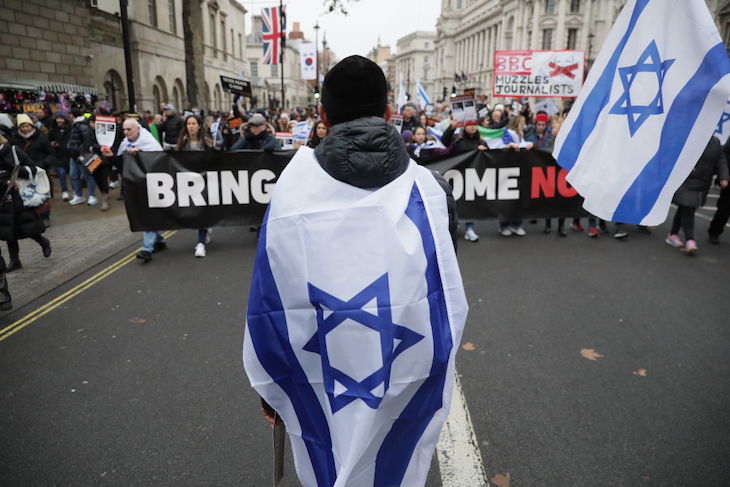If you’re a Brit who doesn’t hate Jews – a smaller number than you might think – then you may be surprised by a poll published over the weekend by the Campaign Against Antisemitism, to coincide with its protest march through London. The CAA’s YouGov poll found that the number of people who admitted – perhaps a better word is boasted – they hate Jews has doubled since 2021.
The reaction to the Holocaust did not destroy Jew hate. It merely buried it
They didn’t put it like that, of course, but it’s what they meant. Respondents were shown a dozen different statements, as prescribed in the ‘Generalised Antisemitism Scale’, half of which were straightforward examples of “Judeophobic antisemitism” and half “anti-Zionist antisemitism”. Statements such as “Jewish people can be trusted just as much as other British people in business; Jewish people are just as loyal to Britain as other British people; Compared to other groups, Jewish people have too much power in the media; Israel can get away with anything because its supporters control the media; Israel treats the Palestinians like the Nazis treated the Jews.”
A fifth agreed with at least four of the 12 statements. Proper Jew haters, in other words, not just people who occasionally come out with lines like, ‘Some of my best friends are Jews, but..’
That estimable Judeophile Julia Hartley-Brewer responded to the poll with a sentiment that is doubtless shared by many: “Congratulations to the BBC, Sky, Channel 4 and other media who’ve helped stirred up this ancient hatred by deliberately perpetrating the lie that Israel is committing a genocide on Gaza. You know better. Shame on you all.” She’s right, of course.
But she’s also wrong, because in reality the BBC, Sky, Channel 4 and other media haven’t made anyone decide to hate Jews. Rather, what they’ve done though the drip, drip, drip of their reporting is to help remove the stigma against admitting to hating Jews. That difference matters.
The received wisdom is that antisemitism has risen exponentially in the past few years. It certainly has. The figures show it is now higher than at any point since the Community Security Trust first started recording antisemitic incidents four decades ago, a trend of rising incidents that started during the years of Jeremy Corbyn’s leadership of the Labour Party.
But to understand the real meaning of any graph, what matters is when you start plotting it – what the index you are measuring covers.
If you plot a graph from, say, 2010 to today, you see a startling rise. But that tells us only one story – that things are bad today, as if what we are now experiencing is some sort of aberration. To grasp the deeper meaning of today’s level of antisemitism and its context, however, it needs to be placed in a longer index going back to 1945.
Do that and you see not just the sudden spike in recent years, but that the real aberration was the decades after 1945 when levels were so low. The unique circumstances of the decades after the Holocaust made expressions of antisemitism socially unacceptable. But we are now discovering something which should have been obvious: the reaction to the Holocaust did not destroy Jew hate. It merely buried it.
It is deeply ahistorical to have considered, as we tended to do until relatively recently, that we had somehow passed beyond antisemitism. It is not called the longest hatred for nothing. What is happening now is that we are now reverting to the mean, when Jew hate is openly expressed. It is a fact of history that a lot of people hate Jews – and act on that hate.
Here in the UK we are relatively fortunate that, so far, we have not had significant outbreaks of violent attacks on Jews. That is not so elsewhere. In France, Australia, Canada and the United States, for example, openly antisemitic attacks are becoming ever more frequent. I do not expect us to be outliers for much longer, especially given the ferocity of the verbal attacks seen on the regular hate marches, as they were accurately labelled by the former Home Secretary, Suella Braverman. As Jews have learned over 2,000 years, words have consequences.
One of the most disturbing but historically unsurprising findings of the poll is that Jew hate is significantly worse among the young: 42 per cent of 18-24 year olds believe that Israel can “get away with anything” because its supporters “control the media”; 58 per cent of young people believe that Israel and its supporters are a bad influence on our democracy; 19 per cent of young people believe that the Hamas attack on Israel on 7 October 2023 was justified. Antisemitism is a virus that not only spreads its net widely, it deepens itself when it is caught. I am sorry to be the voice of doom, but today’s rising antisemitism is nothing new. It is not even the new norm. It is the old norm, returning.







Comments